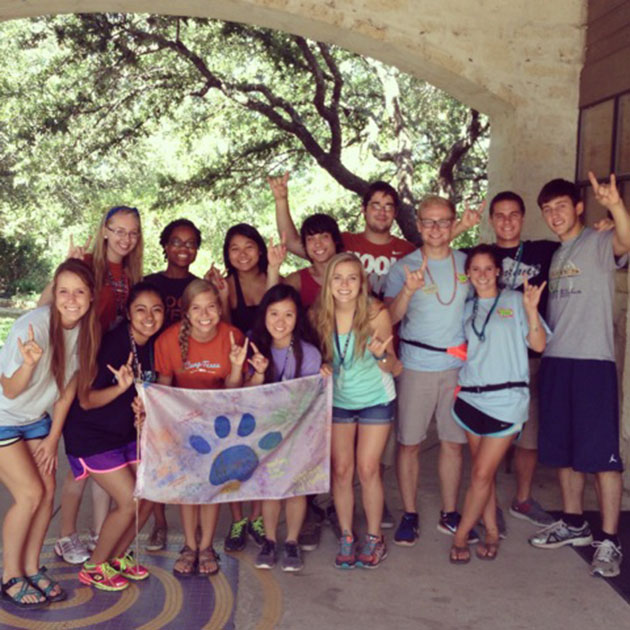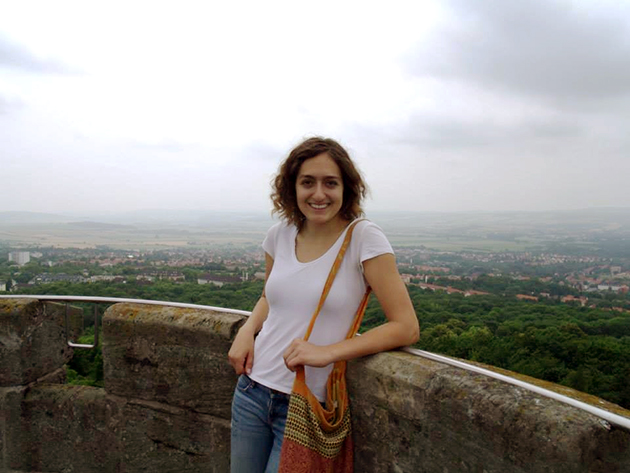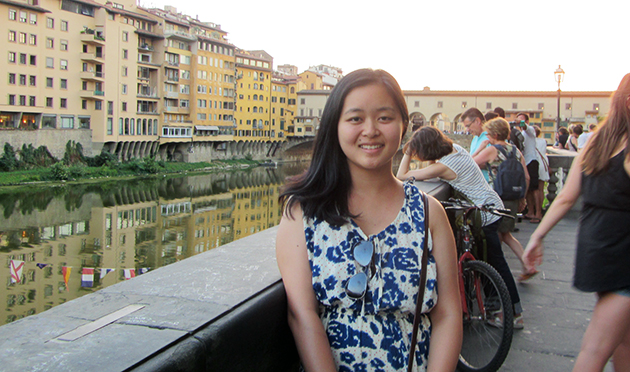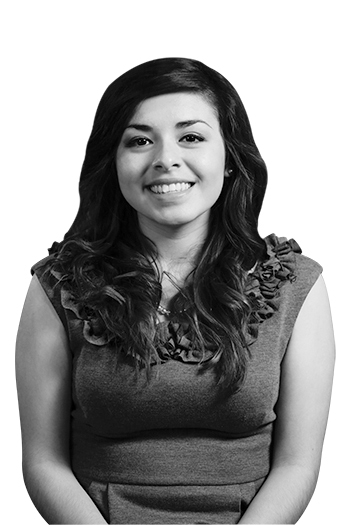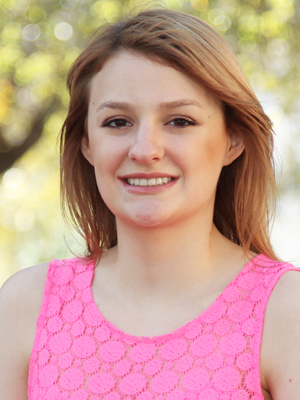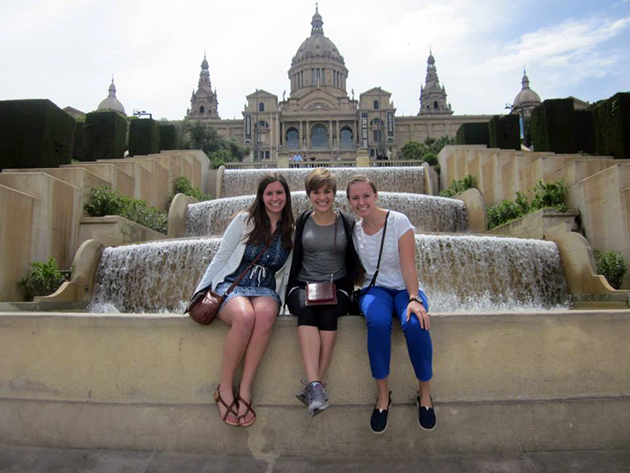The Artist's Way: A Forty Acres Scholar Finds His Voice
Connor Frew spent the summer before college scrounging for paint and supplies and ended up settling for the cheapest material he could find: rejected house paint samples from Home Depot.
"I was working with whatever I could get my hands on," says Frew, a freshman in the Forty Acres Scholar Program who is majoring in Studio Art.
Frew says he doesn't believe in categorizing his work is in any formal art term and instead he studies art history, reads books from his favorite artists, mixes mediums, and tries out new techniques every time he wants to make something.
That unusual approach paid off when Frew was chosen to compete in an event called Artist v Architect which was held in Dallas on Nov. 14. Members of the two disciplines competed and collaborated to celebrate the interplay of modern art and architecture.
Frew used the competition to try out a new technique of enlarging photos, applying latex paint, and then removing the paint to expose what he calls "ghostings" in the grains and grooves of the prints.
In the spirit of collaboration, Frew worked with architect Andrew Cortez to create a walk-through space from 4-feet-by-6-feet planks of wood, steel bars, and draped fabric to represent a person's connection with a building and space.
"We called it 'Portal,'" Frew says. "What was really interesting is after you could see footprints across the bottom and it was like 'Wow, they got it,' when it came to our idea of actually going through it."
Audience members were given two tokens at the event in order to vote for their favorite, and while neither of Frew's pieces won, he says he is still grateful for the experience, especially since he was the youngest one competing.
"There was a wide range of ages, I'd say mainly between 30s and 50s," he says. "And then there was me."
Even though he's only headed into his second semester at UT, Frew says he is excited for more opportunities that will allow him to immerse himself in his love of art and art history—and he knows the Forty Acres Scholars Program will be a big part of making that possible.
"It's knowing that I'm going to have access to everything I need, and knowing that I can be crazy ambitious while still having a support system," Frew says. "It drives me to go out and learn and experience more while I'm here because I know they believe in me."
From top: A slideshow of Connor Frew's art portfolio from his Tumblr; Frew's collaborative piece from the Artist v Architect competition, entitled "Portal"; Frew's individual work from the competition, "Ghostings."
Photos courtesy Connor Frew.
Feature
Lede Image
Box List 1 - Featured
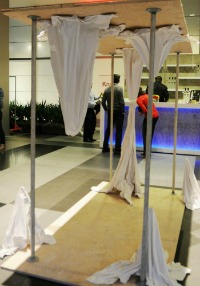
The Artist's Way: A Forty Acres Scholar Finds His Voice
Connor Frew spent the summer before college scrounging for paint and supplies and ended up settling for the cheapest material he could find: rejected house paint samples from Home Depot. "I was working with whatever I could get my hands on," says Frew, a freshman in the Forty Acres Scholar Program who is majoring in Studio Art. Frew says he doesn't believe in categorizing his work is in any formal art term and instead he studies art history, reads books from his favorite artists, mixes mediums, and tries out new techniques every time he wants to make something. That unusual approach paid off when Frew was chosen to compete in an event called Artist v Architect which was held in Dallas on Nov. 14. Members of the two disciplines competed and collaborated to celebrate the interplay of modern art and architecture. Frew used the competition to try out a new technique of enlarging photos, applying latex paint, and then removing the paint to expose what he calls "ghostings" in the grains and grooves of the prints. In the spirit of collaboration, Frew worked with architect Andrew Cortez to create a walk-through space from 4-feet-by-6-feet planks of wood, steel bars, and draped fabric to represent a person's connection with a building and space. "We called it 'Portal,'" Frew says. "What was really interesting is after you could see footprints across the bottom and it was like 'Wow, they got it,' when it came to our idea of actually going through it." Audience members were given two tokens at the event in order to vote for their favorite, and while neither of Frew's pieces won, he says he is still grateful for the experience, especially since he was the youngest one competing. "There was a wide range of ages, I'd say mainly between 30s and 50s," he says. "And then there was me." Even though he's only headed into his second semester at UT, Frew says he is excited for more opportunities that will allow him to immerse himself in his love of art and art history—and he knows the Forty Acres Scholars Program will be a big part of making that possible. "It's knowing that I'm going to have access to everything I need, and knowing that I can be crazy ambitious while still having a support system," Frew says. "It drives me to go out and learn and experience more while I'm here because I know they believe in me." From top: A slideshow of Connor Frew's art portfolio from his Tumblr; Frew's collaborative piece from the Artist v Architect competition, entitled "Portal"; Frew's individual work from the competition, "Ghostings." Photos courtesy Connor Frew.
Box List 1 - Teaser

The Artist's Way: A Forty Acres Scholar Finds His Voice
Connor Frew spent the summer before college scrounging for paint and supplies and ended up settling for the cheapest material he could find: rejected house paint samples from Home Depot. "I was working with whatever I could get my hands on," says Frew, a freshman in the Forty Acres Scholar Program who is majoring in Studio Art. Frew says he doesn't believe in categorizing his work is in any formal art term and instead he studies art history, reads books from his favorite artists, mixes mediums, and tries out new techniques every time he wants to make something. That unusual approach paid off when Frew was chosen to compete in an event called Artist v Architect which was held in Dallas on Nov. 14. Members of the two disciplines competed and collaborated to celebrate the interplay of modern art and architecture. Frew used the competition to try out a new technique of enlarging photos, applying latex paint, and then removing the paint to expose what he calls "ghostings" in the grains and grooves of the prints. In the spirit of collaboration, Frew worked with architect Andrew Cortez to create a walk-through space from 4-feet-by-6-feet planks of wood, steel bars, and draped fabric to represent a person's connection with a building and space. "We called it 'Portal,'" Frew says. "What was really interesting is after you could see footprints across the bottom and it was like 'Wow, they got it,' when it came to our idea of actually going through it." Audience members were given two tokens at the event in order to vote for their favorite, and while neither of Frew's pieces won, he says he is still grateful for the experience, especially since he was the youngest one competing. "There was a wide range of ages, I'd say mainly between 30s and 50s," he says. "And then there was me." Even though he's only headed into his second semester at UT, Frew says he is excited for more opportunities that will allow him to immerse himself in his love of art and art history—and he knows the Forty Acres Scholars Program will be a big part of making that possible. "It's knowing that I'm going to have access to everything I need, and knowing that I can be crazy ambitious while still having a support system," Frew says. "It drives me to go out and learn and experience more while I'm here because I know they believe in me." From top: A slideshow of Connor Frew's art portfolio from his Tumblr; Frew's collaborative piece from the Artist v Architect competition, entitled "Portal"; Frew's individual work from the competition, "Ghostings." Photos courtesy Connor Frew.
Search Result

The Artist's Way: A Forty Acres Scholar Finds His Voice
Connor Frew spent the summer before college scrounging for paint and supplies and ended up settling for the cheapest material he could find: rejected house paint samples from Home Depot. "I was working with whatever I could get my hands on," says Frew, a freshman in the Forty Acres Scholar Program who is majoring in Studio Art. Frew says he doesn't believe in categorizing his work is in any formal art term and instead he studies art history, reads books from his favorite artists, mixes mediums, and tries out new techniques every time he wants to make something. That unusual approach paid off when Frew was chosen to compete in an event called Artist v Architect which was held in Dallas on Nov. 14. Members of the two disciplines competed and collaborated to celebrate the interplay of modern art and architecture. Frew used the competition to try out a new technique of enlarging photos, applying latex paint, and then removing the paint to expose what he calls "ghostings" in the grains and grooves of the prints. In the spirit of collaboration, Frew worked with architect Andrew Cortez to create a walk-through space from 4-feet-by-6-feet planks of wood, steel bars, and draped fabric to represent a person's connection with a building and space. "We called it 'Portal,'" Frew says. "What was really interesting is after you could see footprints across the bottom and it was like 'Wow, they got it,' when it came to our idea of actually going through it." Audience members were given two tokens at the event in order to vote for their favorite, and while neither of Frew's pieces won, he says he is still grateful for the experience, especially since he was the youngest one competing. "There was a wide range of ages, I'd say mainly between 30s and 50s," he says. "And then there was me." Even though he's only headed into his second semester at UT, Frew says he is excited for more opportunities that will allow him to immerse himself in his love of art and art history—and he knows the Forty Acres Scholars Program will be a big part of making that possible. "It's knowing that I'm going to have access to everything I need, and knowing that I can be crazy ambitious while still having a support system," Frew says. "It drives me to go out and learn and experience more while I'm here because I know they believe in me." From top: A slideshow of Connor Frew's art portfolio from his Tumblr; Frew's collaborative piece from the Artist v Architect competition, entitled "Portal"; Frew's individual work from the competition, "Ghostings." Photos courtesy Connor Frew.
View List

The Artist's Way: A Forty Acres Scholar Finds His Voice
Connor Frew spent the summer before college scrounging for paint and supplies and ended up settling for the cheapest material he could find: rejected house paint samples from Home Depot. "I was working with whatever I could get my hands on," says Frew, a freshman in the Forty Acres Scholar Program who is majoring in Studio Art. Frew says he doesn't believe in categorizing his work is in any formal art term and instead he studies art history, reads books from his favorite artists, mixes mediums, and tries out new techniques every time he wants to make something. That unusual approach paid off when Frew was chosen to compete in an event called Artist v Architect which was held in Dallas on Nov. 14. Members of the two disciplines competed and collaborated to celebrate the interplay of modern art and architecture. Frew used the competition to try out a new technique of enlarging photos, applying latex paint, and then removing the paint to expose what he calls "ghostings" in the grains and grooves of the prints. In the spirit of collaboration, Frew worked with architect Andrew Cortez to create a walk-through space from 4-feet-by-6-feet planks of wood, steel bars, and draped fabric to represent a person's connection with a building and space. "We called it 'Portal,'" Frew says. "What was really interesting is after you could see footprints across the bottom and it was like 'Wow, they got it,' when it came to our idea of actually going through it." Audience members were given two tokens at the event in order to vote for their favorite, and while neither of Frew's pieces won, he says he is still grateful for the experience, especially since he was the youngest one competing. "There was a wide range of ages, I'd say mainly between 30s and 50s," he says. "And then there was me." Even though he's only headed into his second semester at UT, Frew says he is excited for more opportunities that will allow him to immerse himself in his love of art and art history—and he knows the Forty Acres Scholars Program will be a big part of making that possible. "It's knowing that I'm going to have access to everything I need, and knowing that I can be crazy ambitious while still having a support system," Frew says. "It drives me to go out and learn and experience more while I'm here because I know they believe in me." From top: A slideshow of Connor Frew's art portfolio from his Tumblr; Frew's collaborative piece from the Artist v Architect competition, entitled "Portal"; Frew's individual work from the competition, "Ghostings." Photos courtesy Connor Frew.


